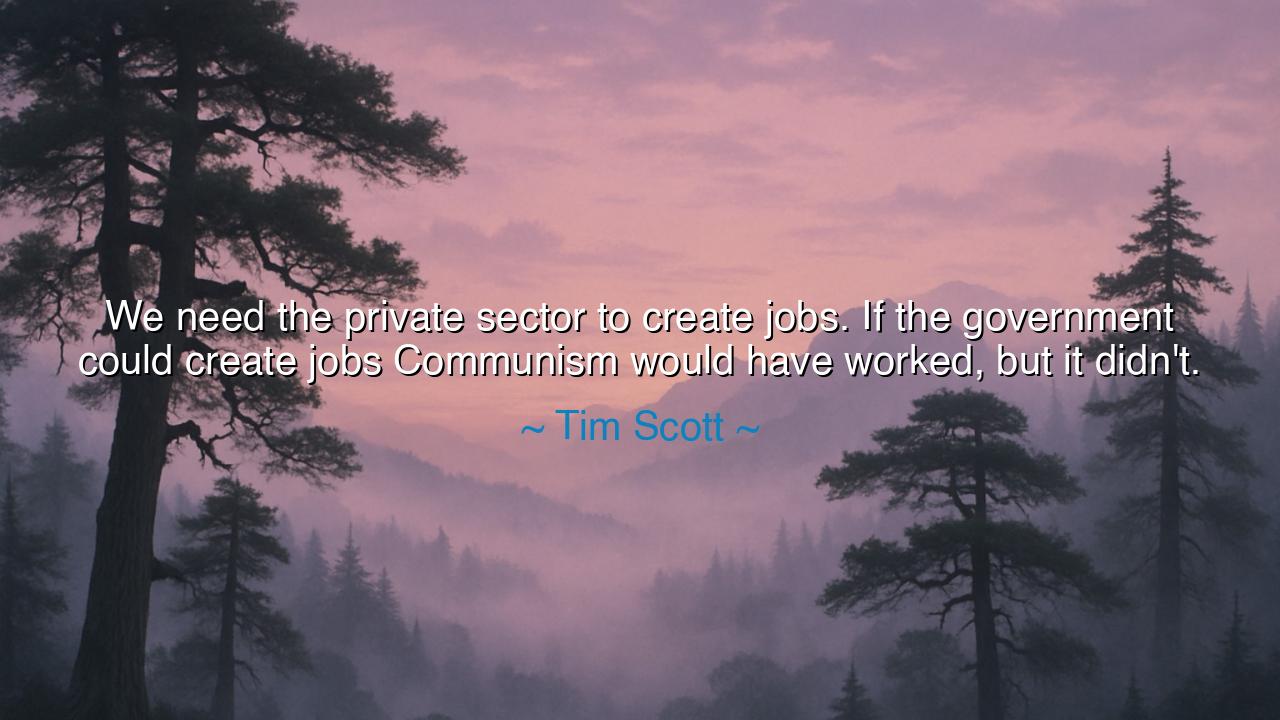
We need the private sector to create jobs. If the government
We need the private sector to create jobs. If the government could create jobs Communism would have worked, but it didn't.






"We need the private sector to create jobs. If the government could create jobs Communism would have worked, but it didn't." – Tim Scott
In this bold and unflinching declaration, Tim Scott, a statesman of principle and faith, delivers a truth forged from the lessons of both history and human nature. His words echo with the conviction that freedom, not control, is the engine of prosperity. He reminds us that while government can protect opportunity, it cannot manufacture it; while it may provide structure, it cannot replace the creative spirit of the individual. His statement is not merely about economics—it is a reflection on the nature of human enterprise, the sacred power of self-determination, and the folly of systems that seek to replace initiative with bureaucracy.
The origin of this quote lies in the long struggle between two visions of society: one that believes in the power of the individual, and another that places faith in the state. Scott, who rose from humble beginnings in South Carolina to become a leader in the U.S. Senate, has often spoken about his own journey—a testament to what can be achieved when people are free to create, build, and work without being shackled by excessive control. His words strike at the heart of a fundamental truth: that governments can distribute wealth, but only free people can create it. In this, he stands in the lineage of thinkers who have warned against the illusion of centrally planned prosperity.
To understand the wisdom in Scott’s words, one must look to the collapse of Communism in the 20th century. The Soviet Union, once heralded as the vanguard of a new economic order, promised equality through state control. It built factories by command and managed production by decree. Yet beneath this façade of order lay a deep and growing decay. When government replaced incentive with compulsion, innovation died. When success was no longer rewarded, effort withered. By the late 1980s, the mighty Soviet empire, rich in land and resources, stood impoverished—its shelves empty, its people weary, its spirit broken. Communism failed not because it lacked organization, but because it denied human freedom.
Contrast this with nations that have embraced the private sector—those that have trusted their people to dream, to risk, to build. After the Second World War, West Germany lay in ruins, its cities shattered and its people destitute. Yet under the guidance of Ludwig Erhard, the country abandoned the model of state control and unleashed a market economy. Within a generation, the “German Miracle” transformed the rubble of war into the powerhouse of Europe. Factories rose, wages grew, and innovation flourished—all because individuals, not bureaucrats, were given the freedom to create. Thus, Scott’s words echo across time: prosperity is not decreed—it is discovered, through the courage and creativity of free men and women.
Yet Scott’s message carries not disdain for government, but a call for balance and humility in its role. The state must be the guardian of justice, not the architect of wealth; the protector of rights, not the master of production. For when government tries to become the source of livelihood, it breeds dependency instead of dignity. A job given by decree is not a job of freedom—it is an assignment of obedience. A job earned by skill, courage, and perseverance, however, becomes a testament to the human spirit. Thus, the purpose of government should be to clear the path, not control the journey.
There is also a moral truth hidden in his statement. Work is not merely an economic act—it is a spiritual one. To labor, to create, to build value with one’s own hands, is to share in the divine act of creation. When the state replaces this with command, it robs the individual of purpose and pride. The systems of forced equality, from the Soviet Union to Mao’s China, sought to erase human greed but instead erased human meaning. Without freedom, work becomes toil; without ownership, ambition dies; without risk, innovation fades.
The lesson, then, is eternal: freedom is the mother of prosperity, and the private sector—the realm of voluntary exchange and creation—is the vessel through which that freedom finds expression. Governments may provide safety nets, but only individuals and businesses can weave the tapestry of growth. The failure of Communism is not merely political—it is moral, for it sought to replace the individual soul with the machinery of the state.
And so, the practical actions are these: embrace your freedom to create. Support policies that empower enterprise, not dependency. Respect honest labor, reward innovation, and remember that every small business, every entrepreneur, every worker who dares to build something new, strengthens the foundation of liberty. For as Tim Scott reminds us, the hand of government cannot replace the heart of man. True prosperity arises when people are free to pursue their dreams—and when nations have the wisdom to let them.






AAdministratorAdministrator
Welcome, honored guests. Please leave a comment, we will respond soon